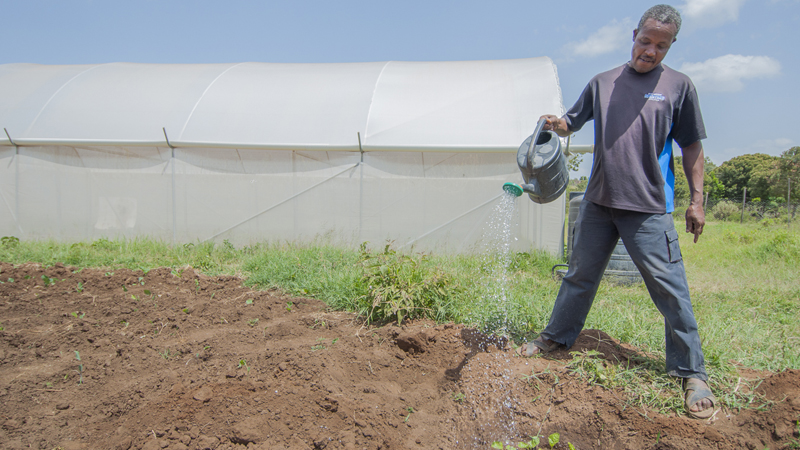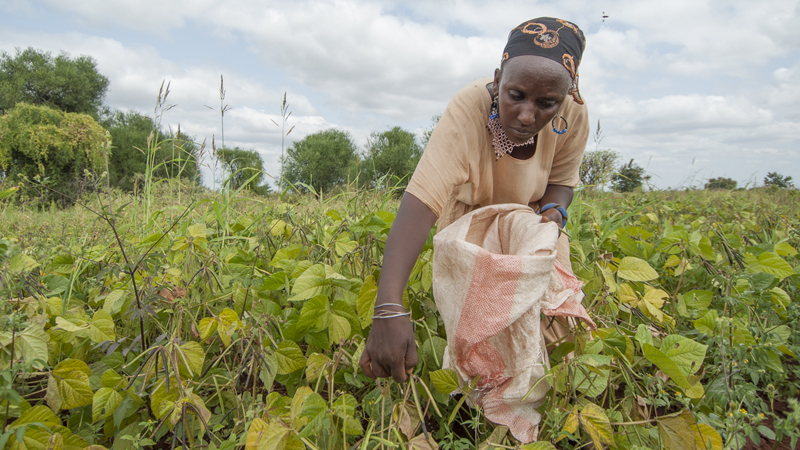Harvest Fast Day: bearing witness to life-changing work
David Mutua, CAFOD’s Africa News Officer based in Nairobi, reflects on some of the invaluable projects he has seen helping people to grow food in Kenya.

Kenya is renowned not only for its award-winning beaches but also the breathtaking safaris. Alongside the 47 million citizens who call Kenya home, many people across the United Kingdom have a special place in their hearts for my country. Members of the British Royal Family have holidayed amidst some of our natural beauty spots on the foothills of Mount Kenya.
Away from the tourist brochures, the lives of so many are being disrupted by the adverse effects of climate change. For people who have always lived off the land, who depend on it to feed their families and earn a living, these changes are having a dramatic impact.
CAFOD food and farming projects in northern Kenya
In June I headed to Maralal and Marsabit in northern Kenya, where CAFOD is working on a climate and agriculture programme funded by our Lent 2015 appeal. The UK government matched pound for pound £5m raised by CAFOD’s supporters, and we are using part of this money to work alongside our partners Caritas Maralal and Caritas Marsabit to teach more than 97,000 community members sustainable farming methods that can be adopted in the very unforgiving environment.
This Harvest, fast for a day and send in the money you save
In Maralal town, climate change has caused rainfall to decrease and become erratic. Water sources have dried up and there’s less pasture for the predominantly pastoralist Samburu community to graze their cattle.
Adapting to the changing climate: a greenhouse
In order to survive, many Samburus have turned to farming. In Tamiyoi village, I met 40-year-old John Lempinskishoi. He told me how his father used to have a great herd of cattle but drought and disease decimated the herd. His father died when he was still young, and John was forced to drop out of school to fend for his younger siblings.
John saw how other communities were adapting to the changing climate: “I worked in many places across Kenya. In Naivasha, I saw greenhouses being used and I desired to adopt this idea back home.”
John called his community and explained the idea. 40 volunteers joined him. He then successfully sought communal land from the village elders, and lobbied the local government to give them a greenhouse.
Donate towards the cost of a greenhouse
The group started, but they were not yielding a good harvest. CAFOD’s partner, Caritas Maralal, stepped in to support and discovered that the group was planting in the same way they would a normal farm and that was causing the low yield. So Caritas Maralal gave the community invaluable support and training on techniques suitable for farming in a greenhouse.
John explained: “We were taught about zai pits, which enable us to use just a little water when irrigating. In the greenhouse, we were trained on line planting in order to maximize crop yield.”
As part of the programme, the group was also supplied with hoes, shovels, watering cans and sprayers, and received drought-resistant maize, bean, onion and kale seeds.
John says the project has given him and others a sustainable future: “Farming has ensured that my children do not sleep hungry and we live much better than we did.”
Adapting to the changing climate: seeds, land and training

Next, I visited Marsabit town, nearly 400 miles north of the capital Nairobi. Due to the changing climate and conflict between different clans, there is fierce competition for resources, which has led to violence between communities.
In Leai village, I met Gumarto Galwesi. “In 2012 my brother in law was murdered,” she told me. “The next morning one of the members’ of our manyatta [village] was killed in cold blood. As a mother, this really scared me. With my four children, we grabbed what we could and sought refuge at a nearby Catholic church.”
After a year as an internally displaced person, Gumarto returned home to find her house burnt, cattle stolen and farm destroyed. Her father gave her some space on his farm to build a temporary shelter and a plot to farm, but Gumarto only knew old-fashioned farming methods that yielded barely enough to feed her children.
Help others like Gumarto to learn new farming methods
Last December CAFOD partner Caritas Marsabit visited the area to see how they could support community members like Gumarto to rebuild their lives after the violence.
“The community were keen on developing their farms and we worked together with them to identify how best to achieve this,” said Bante Galgallo, Caritas Marsabit Disaster Risk Reduction Officer. “We were given a piece of land by the community where we conducted practical training sessions.”
Gumarto now grows a variety of crops – maize, beans and lentils. “I have adopted the lessons learnt on the Caritas farm and used them on my own land. We were taught that for beans you need less space between the plants, while maize needs more space. We never knew this. I look forward to a bumper harvest.”
It was a privilege to spend time with the communities, and see what a difference your generous donations, matched pound for pound by the UK government, can make.
Living in the city, it can be all too easy to forget how climate change is affecting those communities who depend solely on the land for their way of life. In these challenging times, it was amazing to bear witness to work which is truly transforming lives.
This Harvest, find out more about CAFOD’s work helping people around the world to grow enough food